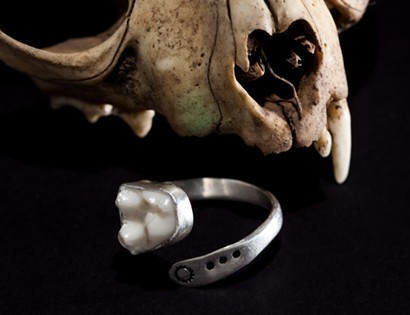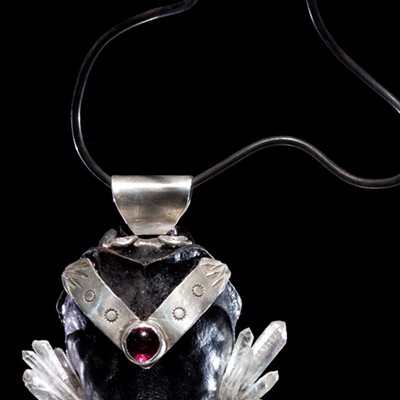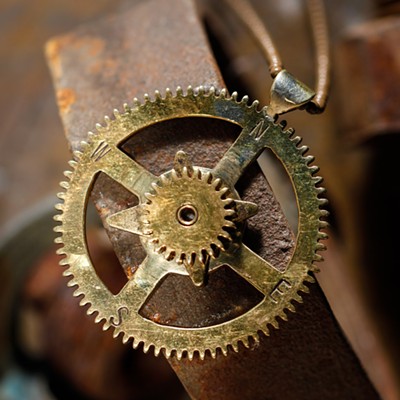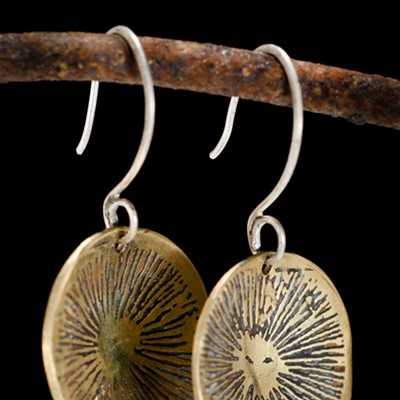"Gruntwerk was just always a term that stuck out in my head, even as a kid," Alyssa Radwick says about the name she chose for her small jewelry business. "I love the phrase — 'Doin' the grunt work.'"
Radwick, who is 23 years old, says she has been making jewelry from found bits of nature since she was a kid. "I'd pick chestnuts at my father's house," she says, "and sit in the driveway with a hammer and a nail and make a whole string of them: a necklace of still-fleshy chestnuts."
It's not difficult to picture a younger version of this rainbow-haired punk pixie, swathing herself with garlands of spikey, lime-colored tree fruit. Today, Radwick makes and sells a range of more enduring jewels, though still largely sourced from nature, which adorn people from punks to the edgy-chic.
"I started Gruntwerk in 2010, while I was traveling, as a means to fund the trip," Radwick says. She began traveling at 17, when she decided to work on a farm in Montana, and since then has visited every continental state except Maine.
Back then, Radwick made jewelry from hemp and intricate wire-wrapping techniques, incorporating scrap wire and found detritus like shells, stones, bones, and bits of metal. She'd set up on sidewalks or along First Friday trails in different towns and cities, finding that for the most part, people were really warm and inviting.
"I figured out that it could work — you really could make a living off doing what you love," she says.
Radwick developed a deeper curiosity about fine metalsmithing techniques, so from January to August of 2014, she moved to New York City to attend a comprehensive fine jewelry program at Studio Jewelers LTD in Manhattan. She made her living strictly off jewelry sales while attending the program five days a week.
"I still use recycled materials as much as possible, but now I'm also working with new silver, gold, and semi-precious stones," she says. "But I will always incorporate what's found and items from nature."
Radwick sources materials as ethically as she can, by mining for minerals and crystals in local caves, and by trading with others. "Anytime you can cut the money out of the equation is awesome," she says. A friend's mother gave her a bunch of gold, half of which she says she'll use to make a ring for the gifter.
Radwick has a firm philosophy about life, respect, and economic flow, which she says tends to be mirrored by her clients. "The kind of person who wears Gruntwerk is a person who understands the state of the world," she says. "A person who doesn't want to contribute to the mass corporations who have forced so many people to become gears in this traditional clock, working jobs where they're not fulfilled, so they can have money to buy things that the companies own."
Gruntwerk's offerings are mostly one of a kind, with a few staples in the shop, like her wisdom tooth rings and necklaces — made from a cast of her own tooth — available in silver or bronze, also with custom crystal "cavities."
Radwick spends a lot of time with the nature-loving community at Smugtown Mushrooms, and worked at the shop from September until just recently. Her recent series of mushroom spore prints, etched like rays on metal plates, are inspired by her time at Smugtown, where you can learn how a spore print helps identify a nourishing or medicinal mushroom from a poisonous species. Radwick hammered the circle plates into a gentle dome shape to resemble fungi fruit, and created earrings from them.
Last year, Radwick was commissioned to make a set of custom wedding bands for a local couple. "It's super sacred and special to be involved in that union," she says. "It pushes me even more. It's crazy that somebody's going to wear it every day for the rest of their union."
To create the cast-gold bands — a Celtic knot for him and a delicate, simple twist for her — Radwick melted down the bride's grandmother's jewelry. She says she is thrilled that she could offer a second life to sentimental objects by transforming them into something the couple will carry with them.
Radwick estimates that about a quarter of her sales are commissions, and about half of the commissions are requests for the raw stuff. "People are always giving me bones they found themselves, and I've worked them into wire wraps," she says.
A frequent buyer in Oregon recently commissioned a pair of plugs for huge-gauged earlobes. Together she and Radwick came up with a design for silver tunnels with mouse skulls in the middle, with crystals set in the eye sockets. A local woman gave Radwick some shed puppy teeth to be incorporated into a custom jewel. Radwick worked them into the shape of a lotus with Herkimer diamond in the center.
Sometimes Radwick sources her bones from sun-bleached finds, which she finishes cleaning at home with hydrogen peroxide (bleach is not good for the bones). She once found a whole coyote carcass, but left it for a few seasons (months later, she returned to the site to go swimming and to bone-pick). But Radwick does sometimes take home and clean up a full corpse. Though she has used bones from deer that were shot for food, Radwick says she'd never use parts of an animal that was shot simply out of malice.
"It's...a process," she says. "As I'm doing it, I'm super grateful to the being that had it before."






